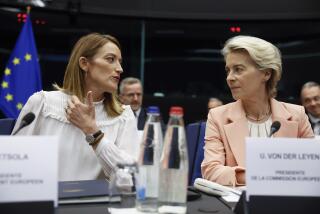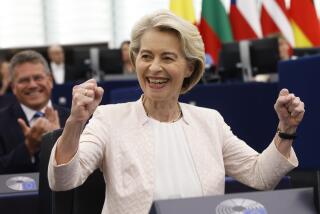Europe’s Iron Lady Finds Steely Match in EC Leader
- Share via
BRUSSELS — In its nearly 32 years of existence, the Commission of the European Community has had eight presidents. Nobody doubted that the first, West Germany’s Walter Hallstein, was a great man. He led the community imperiously and well for nine years until 1967, when insuperable personality and policy clashes with French President Charles de Gaulle led to his resignation.
Only one other former president made much of a mark: British Social Democrat Roy Jenkins, who launched the European Monetary System during his four-year term, 1977-1981. The other half-dozen ex-presidents may best be characterized as “worthy but dull.”
The current incumbent, Jacques Delors, is half a year into his second four-year term and has proved the strongest president since Hallstein. Since last month’s historic EC summit at Madrid, when his plan to lead Europe into an economic and monetary union was endorsed by all 12 heads of government--including Britain’s extremely reluctant Margaret Thatcher--estimations of Delors’ strength have to be revised upward. He now stands as the most creative and effective leader that the European Community has ever had.
Delors came to Brussels largely by accident. In 1984, when he was first appointed, the member states were pretty well agreed that it was West Germany’s “turn” for the presidency, and they expected Chancellor Helmut Kohl to propose a suitable candidate. Kohl failed to oblige, so French President Francois Mitterrand took advantage of the vacuum to head off a problem of internal rivalry in his Cabinet.
Delors, who had been a highly successful finance minister, was disappointed at being passed over for the premiership in favor of a much younger man, Laurent Fabius. Fearing that the two men would not get on, Mitterrand offered Delors the “golden exile” of EC presidency, which he accepted with alacrity.
Now a youthful-looking 63, Delors has had an unusual career. The son of a minor official at the Banque de France, he followed his father into the bank and missed out on a university education in the process. He made up for that by studying philosophy and political science in evening classes, while working his way doggedly up from the bottom, simultaneously involving himself in the Roman Catholic trade-union movement. He spent 17 years in the bank, then left to become head of the social-affairs department in the government planning commission. He subsequently spent five years as adviser on social affairs to the Gaullist prime minister, Jacques Chabam-Delmas. Not until he was 49 did Delors join the Socialist Party, and the only election he has fought was for the European Parliament in 1979. He was fished out of Parliament to become finance minister two years later.
Delors was responsible for the austere financial policies that restored equilibrium in the French economy after Mitterrand’s ill-judged dash for growth following his first election in 1981. He also insisted that France should follow liberal trade policies within the EC rather than attempt the “fortress France” protectionism favored by some other Socialist ministers.
With this record behind him, Delors was initially very acceptable to the more right-wing EC leaders such as Kohl and Thatcher, as well as to moderate Socialists such as Italy’s Bettino Craxi and Spain’s Felipe Gonzalez. He lost little time in restoring a sense of direction to the EC, which had been drifting for years in a sea of “Euro-pessimism.” It was Delors who formulated the 1992 program for completing the EC’s internal market, and he gave full backing to the former British commissioner, Lord Cockfield (later sacked by Thatcher), who had the responsibility for its implementation.
A workaholic reputed to be in his Brussels office “from 8 a.m. when the Danes get to their desks until 10 p.m. when the Spaniards leave theirs,” Delors nevertheless retains a range of outside interests. These include the cinema--a poster of “Citizen Kane” decorates his office wall--jazz (particularly Count Basie) and sport (cycle racing and football). In his younger days he played scrum-half at rugby. He and his wife, Marie, live modestly in a small apartment only 10 minutes, by foot, from EC headquarters. Their only daughter is now married; their son was killed in a road accident some years ago.
With his sharp analytical mind, Delors dominates the other 16 members of the EC Commission, and he now appears to have established a comparable ascendancy over the 12 heads of government--with the single exception of Thatcher. She seems to have decided about a year ago that he was a dangerous socialist firebrand who needed to be severely curbed. Many observers then predicted that Delors was heading for a fall.
But the Iron Lady’s campaign badly misfired. She found no allies among the other member states, and her attempt to characterize Brussels’ initiatives as “socialism through the back door” was repudiated by many in her own Conservative Party. The party’s defeat in last month’s Euro-elections was almost universally attributed to the stridently anti-EC tone that Thatcher personally injected into the campaign.
It was, accordingly, a chastened Thatcher who turned up at the Madrid summit, where she found that the effective choice facing her was either to participate in preparations for a monetary and economic union, with eventually a European central bank and common currency, or watch the other 11 member states go ahead without her. A similar dilemma will face her at the December EC summit in Strasbourg, when the other states will certainly endorse another current Delors’ project--a social charter to buttress the 1992 program with new guarantees of workers’ rights.
Thatcher may still be able to delay Delors’ plans and water them down. But she has clearly lost her battle to prevent the enlargement of EC competence in fields once reserved for the different nation-states.
As his competence grows, so inevitably will Delors’ authority. He is set to become a dominant figure in European politics and may well continue as commission president even beyond 1992, when his second term ends. Unless, of course, he is summoned back to France as the obvious successor to Mitterrand. More and more Frenchmen are now convinced that this is what the future holds.
More to Read
Sign up for Essential California
The most important California stories and recommendations in your inbox every morning.
You may occasionally receive promotional content from the Los Angeles Times.













